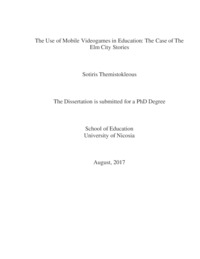- Themistokleous, Sotiris
- Department of Education
- August 2017
- English
- 278 pages
- Avraamidou, Lucy
- Mobile Videogames | Health literacy | Social Constructivism | Decision Making | Non-formal Learning | Negotiated Play
- Education, Primary -- Videogames
- Original: Unic - Rules: RDA
-
-
The purpose of this study is to examine the ways in which mobile videogames can be used in non formal educational environments, to support students to develop decision-making skills through negotiated play. In the context of this qualitative case study, the health literacy mobile videogame, PlayForward: Elm City Stories developed at Yale University was implemented in an afterschool setting in Cyprus.
The game was implemented through a collaborative pedagogical framework, based on the primary theoretical premises of social constructivism, where students had the opportunity to play the game in groups, and negotiate the meaning-making and learning process. In this format, social trajectories were developed among students, attracting students to the game play and assisting the development of their social skills. The case study addresses the fragmentation of young students from core health literacy skills development, the decontextualisation of health literacy initiatives, the absence of an instructional framework for the use of mobile videogames in non-formal education, and the dichotomy between formal and non-formal education.
This research explores how students negotiate meaning, make decisions, and interpret the consequences in a non-formal education context, through an ethnographic, interpretive, and symbolic interactive framework. This investigation was based on a qualitative case study research methodology, and data were analyzed using open coding strategies to look for patterns in students’ discourse, and their interactions, as they played the game.
-


